

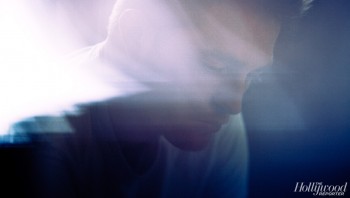
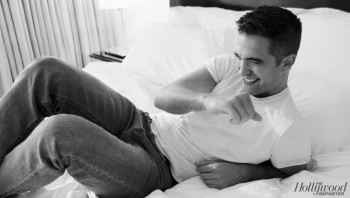
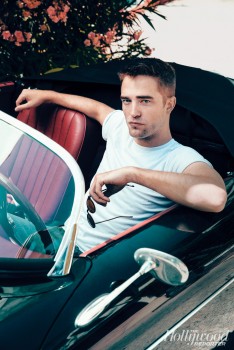
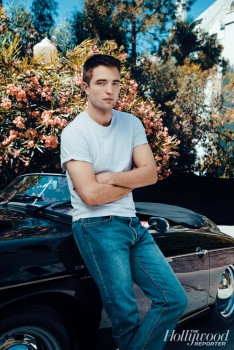
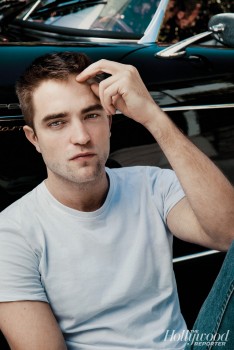
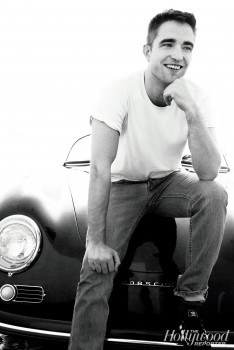
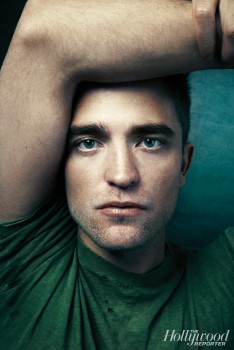
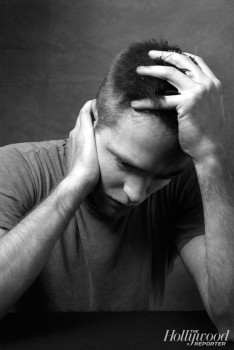
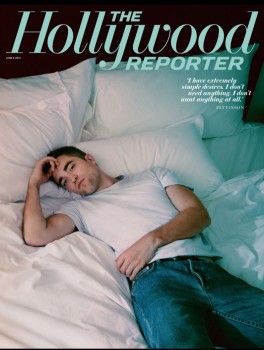
Interview
On April 21, 2012, Robert Pattinson slipped into a rented Toyota Camry and set out on the 10-minute drive from his home in L.A.'s Los Feliz to Koreatown. The actor was anxious; he was about to audition for a role he desperately wanted, and auditions are hardly his forte. "I hate auditioning," he says. "I just can't do it. I get so nervous, like cripplingly nervous. I'm bad at them, and I feel awful afterward." Nor were his nerves soothed by his recent forays into indie film. Such pictures as Bel Ami and Little Ashes had come and gone with more of a fizzle than a bang, and Cosmopolis would sputter out soon -- all mere squibs compared to the supernova Twilight, which earned $3.3 billion at the box office and brought Pattinson $20 million for its final installment alone.
He wanted this part -- needed it, even -- to prove he no longer was just a dark, brooding, iridescent, slightly humorless, 100-year-old vampire named Edward Cullen. So he arrived at his destination young, handsome, famous and worried as hell. "It was terrifying," he says. "It's kind of rare that I really, really want stuff."
He shouldn't have stressed (though maybe that helped). "He came through with flying colors," says David Michod, the Australian director of 2010's Animal Kingdom, who put the actor through his paces in a marathon three-hour meeting that included lengthy conversations, scene readings and improvisation, all to see if he could play a slow-witted gang member who sets out on a road trip with Guy Pearce across a dystopian Australia in search of the latter's stolen car. "He came the closest of any actor to walking into the room with a beautiful, fully realized version of the character that was not dissimilar to mine. It was exhilarating because I could suddenly see the movie."
Now Pattinson is hoping audiences will be exhilarated, too, when The Rover opens June 20, a month after its debut at the Cannes Film Festival. "Fusing a hybrid of quasi-apocalyptic influences into a work with a pungent character of its own, The Rover suggests something like a Cormac McCarthy vision of Australia halfway between today and The Road Warrior times," wrote THR's chief film critic Todd McCarthy.
Rover is one of two pictures that Pattinson is counting on to propel him to the next phase of his career, along with David Cronenberg's Hollywood satire Maps to the Stars, which opens in the fall. Both are art house films, both labors of love, both as different from Twilight as any picture can be, and both equally important to defining Pattinson as a grown-up.
The actor galvanized a generation of teenagers (and their mothers) with a vampire franchise, became impossibly famous and now, at age 28, is asking, what's my second act?
That's a question facing several of Pattinson's contemporaries, from Harry Potter's Daniel Radcliffe and Emma Watson to Transformers' Shia LaBeouf, all of whom have struggled to break free of career-defining franchises at the very time so many other actors are chasing them.
Radcliffe has had modest success in film and has turned to Broadway with acclaimed productions like The Cripple of Inishmaan; Watson remains a fashion cynosure who had little to do in Noah but next works for Guillermo del Toro in Beauty and the Beast; and LaBeouf, following some public adventures in plagiarism, revealed himself in Lars von Trier's Nymphomaniac.
Pattinson has chosen his own clear path: to work with the best directors he can find, from Cronenberg to Werner Herzog (who cast him as T.E. Lawrence in Queen of the Desert, out this year) to James Gray (for whom he'll star opposite Benedict Cumberbatch in The Lost City of Z).
He isn't averse to calling the filmmakers he admires out of the blue, as he did Spring Breakers' Harmony Korine. "We went to have dinner. He was really nice. But it took me a long time to realize I could do that," says Pattinson of making cold calls to directors. Korine now is writing a script for him, shrouded in mystery. "He won't even tell me what it's about," grins Pattinson.
Sitting over lunch May 14 at West Hollywood's Soho House, where he has arrived in his battered, black, 1989 BMW convertible, he seems remarkably unperturbed by the challenges ahead. Dressed in black pants and a white T-shirt, he's light, bright and eager to please and not remotely like the haunted character who made him famous. "I did some interview a while ago, and it sounds like I'm a manic-depressive about to kill myself," he says. "And I'm like, 'No I'm not!' "
Nothing much troubles him -- not the sweltering heat where we sit, nor the distant acquaintances who keep interrupting to say hello, nor my endless questions about Twilight, the five-picture saga whose muscular release at times overwhelmed him.
"Everything changed when they did the marketing, and the general public started to view [the films] in a different way when they started to push the 'team' aspect of it," he says of an otherwise positive experience. "It was like, 'I'm on Team Edward or Team Jacob.' That saturated everything, and suddenly there was a backlash. Whereas with the first [film], there wasn't a backlash at all."
The backlash turned personal when Pattinson's relationship with co-star and girlfriend Kristen Stewart soured after she was caught with her Snow White and the Huntsman director Rupert Sanders, making Pattinson "a cuckolded vampire," as one blog put it. He won't talk about any of that. But are they still in contact? "Oh, yeah," he says blithely.
He largely is indifferent to money (somewhat easier when you have oodles of it) and has little of material worth beyond his collection of around 17 guitars. "I buy nice guitars, and that's about my only expense," he says, singling out "an acoustic Gibson J100 from 1943 or something."
He recently sold the 1922 Los Feliz mansion that he bought for $6.27 million about three years ago because he felt engulfed by its sheer size. "It was too big a house," he says. "It was incredible, like Versailles. It was absolutely, completely crazy. It had this incredible garden, but you just stay in one room, anyway. I could basically live in a cell as long as I had a window."
Since then, he has shacked up in a rented place within a gated community in Coldwater Canyon. His decor is decidedly bare-bones: He moved in with just three inflatable mattresses and "this one kind of shitty chair that was left from the previous tenants [in Los Feliz]," he says, laughing. "I would move my mattresses into different rooms according to the occasion. It was very odd for a while."
Since the move, he has been unable to locate many of his possessions, including some much-needed clothes. "I don't understand how I don't have any clothes," he groans. "I've basically stolen every item of clothing that anyone's ever given me for a premiere, but in my closet there's literally about three things."
He can't even find his beloved DVD collection. A movie buff, he favors films from One Flew Over the Cuckoo's Nest to Breathless to the recent Smashed. Still, with typical self-deprecation, he swats away any hint he's a connoisseur. "I was so into [film history] when I was a teenager; I thought it would impress people," he says. "But then you get older, and no one gives a shit."
Cronenberg takes that with a grain of salt. "He is incredibly knowledgeable about cinema, almost academically," he says. "I remember coming across him on the set of Cosmopolis as he was talking to Juliette Binoche about obscure French films, and that surprised me. But as I got to know him better, I found he has a very European sensibility. He has a highly functioning intellect, which might be surprising given the characters he is playing."
In the pre-Twilight era, Pattinson barely scraped together a living. He was down and out in London, sharing an apartment with actor Tom Sturridge and still licking his wounds after being fired from a production of Roland Schimmelpfennig's The Woman Before at the Royal Court Theatre. ("I don't know why I was fired. They probably said something, but I was so furious I wasn't even listening," he says.)
He'd stumbled into acting as a teenager, drawn by the cute girls who hovered around, taking part in productions with the local Barnes Theatre Company, near his parents' home outside London. His father often was busy with his vintage-car business, leaving Pattinson with his mother and two older sisters. While manning a paper route, he got occasional work as a model (his mom was a booker for a modeling agency), then as a teenage actor he had a well-regarded small role in 2005's Harry Potter and the Goblet of Fire. He wasn't entirely sure he wanted to act and thought for a while of going into politics in some capacity. But at age 21 he came to Los Angeles -- sleeping in the home of his WME agent, Stephanie Ritz -- to audition for the rom-com Post Grad.
"I was so into the script of it and thought I knew exactly what I was doing," he says. "And then I went in and just completely blew it. And honestly, I remember talking to my family afterward and going, 'I'm done. I can't handle how gut-wrenching it is.' And I kind of knew that I was messing it up. It was my own fault."
While in L.A., almost as an after-thought he auditioned for Twilight, based on the young-adult novel by Stephenie Meyer about a teenage girl who moves to a small town in Washington and falls in love with a vampire, a scion of the immortal Cullen clan. He'd done an audition tape when he was at home in London, "with Tom [Sturridge] playing Bella." After that, director Catherine Hardwicke called him at 2:30 in the morning, when they had "this ridiculous conversation, and I hadn't read the books or the script or anything and I just bullshitted on the phone."
Now he went to Hardwicke's home in Venice, Calif., where he met Stewart, already cast in the lead role, for the first time. "They were doing screen tests with four people," he recalls. "In one of the scenes, I [was meant] to take my shirt off, and I think I was the one guy who didn't."
Lionsgate wasn't immediately sold on him, and some of the producers wondered whether he was too old for the role of an eternal high-schooler (he was 21 at the time), but his agent kept pushing. "Stephanie was like, 'You've got to go and meet the producers and just shave 20 times before you go,' " he says.
The big shave worked, and Pattinson got the part: "It was basically the last-chance saloon when I got Twilight."
The franchise's five films changed his life, to his surprise. He'd thought this would be "like [Hardwicke's previous film] Thirteen but with vampires. I genuinely had no idea it was going to be a [blockbuster]." He says the role of Edward was unexpectedly challenging: "It was quite a constricting character, in a way. You want to make [him] as dramatic as possible, but you have someone who never loses his temper, and so it's like, 'How the f-- do you do this?' I think that was one of the hardest jobs I've ever done."
Pattinson spent the next four years in the Twilight zone and barely has stopped working since. He hasn't had a vacation in years, partly because fame makes it hard for him to travel. "I don't think I've been anywhere other than for work," he says. "I have a fear of missing out."
The $12 million Rover, which A24 is releasing, took him to Australia, where he faced a grueling shoot spread across five locations, including the town of Marree (population 90). It was shot "absolutely in the middle of nowhere," he says. "There's a road that goes from the east to the west of Australia, through the Outback, and we were at the point where it turns into a dirt track. It was the end of the tarmac, in this town of 90 people."
He shot there for 41 days, living in what looked like "a shipping container with windows," in the midst of a heat wave with temperatures soaring past 100 degrees and "a trillion flies. As soon as the light came up, you'd have flies trying to crawl into your eyes the entire day."
Despite the harshness, "There was something so [great], just being able to look for absolutely miles to the horizon," Pattinson says. "There's something really calming about it."
A friend gave him an audiotape on meditation while he was working on Maps in Toronto, and he has stuck with it. "I'm easy with most things," he adds, noting the one exception is the paparazzi, who still hound him. He remembers being pursued for hours as he tried to avoid leading them to his home. "It was like eight cars following me. And this went on for 10 hours, this thing. I literally didn't know what to do. [But] you figure out ways to deal with it. It's been such a long time now, it just becomes what your life is. I can't even really remember what my life was like before."
Now he says his life is defined more by being alone or hanging out with a few friends than by the trappings of celebrity.
He's "a relatively solitary person," though for a loner he's strikingly affable and equally loyal. He retains many of the friends he grew up with, the same manager (3 Arts Entertainment's Nick Frenkel) and agent (Ritz). "She still has a bag I left there [at her house]," he jokes, "probably filled with my dirty washing."
Two days before our meeting, he celebrated his May 13 birthday with about 20 friends at the Chateau Marmont, over a dinner "that just went on way too long." He says he's still recuperating. "I've been in L.A. for five years, so I know a bunch of people here now. It was nice."
He keeps up with some of his Twilight pals, too, and occasionally plays poker with Kellan Lutz, who's considerably better than he is, to his chagrin. "It's ridiculous!" he says. "It's like they basically just ask, 'Do you want to spend $500 to hang with us?' 'Oh, great!' "
Such escapades aside, he admits to being somewhat ascetic and says his greatest pleasure recently was floating on an inflatable chair in a pool with a bottle of rosé. "I literally felt, 'This is absolute heaven. This is all I require out of life,' " he says.
He's almost frighteningly normal -- an anti-star, an actor who has stumbled into celebrity despite himself, who doesn't want it or need it any more than the superfluous mansion he abandoned in Los Feliz. "He could grab that brass ring and keep doing big-budget studio movies," says Cronenberg. "But it's not his desire to be a big Hollywood star."
Just what his desire is remains unclear. Improving himself is part of it: "I don't know if I've really particularly found my feet as an actor yet -- I have to prove certain things," he says. But beyond that, he's that rarest of creatures, a young man who seems largely content. "I have extremely simple desires. I don't need anything. I don't want anything at all."
Source
No comments:
Post a Comment